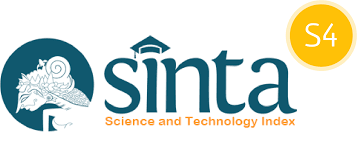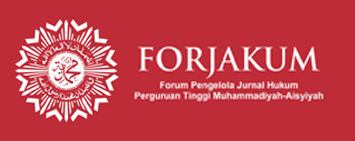Peran dan Kedudukan Dewan Gelar, Tanda Jasa Dan Tanda Kehormatan Dalam Sistem Ketatanegaraan Di Indonesia
DOI:
https://doi.org/10.18196/mls.v3i3.14316Keywords:
Dewan GTK, auxiliary, executiveAbstract
The aim of this study is to determine the role and position of the Dewan Gelar, Tanda Jasa dan Tanda Kehormatan (Dewan GTK) in the Administration System in Indonesia. The research method used is empirical normative research using a statutory approach. The results of the study found that Dewan GTK is a supporting institution or state auxiliary bodies or auxiliary institutions for executive power in the system of state administration in Indonesia. According to the theory of State Auxiliary Bodies (SAB), Dewan GTK includes Executive-Auxiliary, namely SAB that is included in the executive realm in general at the auxiliary level. In this category there are two different types of SAB functions which are to coordinate and to provide policy suggestions / recommendations to the President which based on its formation consists of two, namely, formed by the President and the second formed to represent certain groups to provide advice and input to the government. Dewan GTK is included as Auxiliary-Advisory, namely SAB which provides advice and considerations to the President.
References
Adam, Asvi Warman. Menguak Misteri Sejarah. Jakarta: PT. Kompas Media Nusantara, 2010.
Akbar, Patrialis. Lembaga-Lembaga Negara Menurut UUD NRI Tahun 1945. Jakarta: Sinar Grafika, 2013.
Al-Faqih et al. Komisi Informasi Reposisi dan Penguatannya. Yogyakarta: CV Budi Utama, 2016)
Arifin, Firmansyah et al. Lembaga Negara dan Sengketa Kewenangan Antar Lembaga Negara. Jakarta: Konsorsium Reformasi Hukum Nasional (KRHN) Bekerjasama dengan Mahkamah Konstitusi RI, 2005.
Asisten Deputi Hubungan Lembaga Negara dan Lembaga Non Struktural. Profil 10 Lembaga Non Struktural di Indonesia. Jakarta: Deputi Bidang Hubungan Kelembagaan dan Kemasyarakatan Kementerian Sekretaria Negara, 2011.
Asshiddiqie, Jimly. Pokok-Pokok Hukum Tata Negara Indonesia Pasca Reformasi. Jakarta: Bhuana Populer Ilmu, 2007.
Assidiqie, Jimly. Perkembangan Dan Konsolidasi Lembaga Negara Pasca Reformasi. Jakarta: Sekretariat Jendral Kepanitraan Mahkamah Konstitusi,2006.
Astawa, I Gde Panjta. Dewan Perwakilan Daerah dalam Sistem Perwakilan menurut UUD 1945. Seminar Penguatan Lembaga Demokrasi DPD-RI Provinsi Jawa Barat oleh Univ. Pasundan, 19 November 2005, 2005.
Awaliyah, Siti. "Sistem Ketatanegaraan Republik Indonesia Berdasarkan Pancasila dan UUD 1945." Jurnal Pendidikan Pancasila dan Kewarganegaraan 24, no 2 (2011).
Capra, Fritjof. Titik Balik Peradaban: Sains, Masyarakat dan Kebangkitan Kebudayaan. Yogyakarta: Bentang, 2000.
Garner, Bryan A. Black’s Law Dictionary. St.Paul-Minn: West Publishing, 1999.
Hadi, Muchlis. State Auxiliary Bodies di Beberapa Negara. Disampaikan dalam dialog hukum dan non hukum “Penataan State Auxiliary Bodies dalam Sistem Ketatanegaraan” Departemen Hukum dan HAM RI, Badan Pembinaan Hukum Nasional bekerjasama dengan Fakultas Hukum Universitas Airlangga, surabaya 26-29 Juni 2007, 2007.
Hakim, Lukman. Kedudukan Hukum Komisi Negara di Indonesia. Malang: Setara Press, 2010.
Indonesia, Undang-Undang tentang Gelar, Tanda Jasa dan Tanda Kehormatan, UU No 20 Tahun 2009 (Lembaran Negara Tahun 2009 No 94. Tambahan Lembaran Negara No 5023)
Indrastuti, Lusia, and Susanto Polamolo. Hukum Tata Negara Dan Reformasi Konstitusi Di Indonesia “Refleksi Proses Dan Prospek Dipersimpangan. Yogyakarta: Total Media, 2013.
Indrati S, Marifa Farida. Ilmu Perundang-undangan: Jenis, fungsi dan Materi Muatan. Yogyakarta: Kanisius, 2007.
Isharyanto. Hukum Kelembagaan Negara(Studi Hukum dan Konstitusi Mengenai Perkembangan Ketatanegaraan Republik Indonesia). Yogyakarta: Deepublish, 2016.
Mamudji, Sri et al. Metode Penelitian dan Penulisan Hukum. Jakarta: Badan Penerbit Fakultas Hukum Universitas Indonesia, 2005.
Milakovich, Michael E, and George J Gordon, Public Administration in America. USA: Wadsworth & Thomson Learning, Seventh Edition, 2001.
Mochtar, Zainal Arifin. Lembaga Negara Independen, Dinamika Perkembangan dan Urgensi Penatannya Kembali Pasca-Amandemen Konstitusi. Jakarta: Rajawali Press, 2016.
Pasal 1 Undang-undang Nomor 20 Tahun 2009 tentang Gelar, Tanda Jasa dan Tanda Kehormatan
Pasal 16 UU No 20 Tahun 2009 tentang Gelar, Tanda Jasa dan Tanda Kehormatan
Pasal 17 Peraturan Pemerintah No 1 Tahun 2010 tentang Dewan Gelar, Tanda Jasa dan Tanda Kehormatan
Pasal 19 Peraturan Pemerintah No 1 Tahun 2010 tentang Dewan Gelar, Tanda Jasa dan Tanda Kehormatan
Pasal 2 ayat (2) 19 Peraturan Pemerintah No 1 Tahun 2010 tentang Dewan Gelar, Tanda Jasa dan Tanda Kehormatan
Penjelasan Pasal 4 PP No 1 Tahun 2010 tentang Dewan Gelar, Tanda Jasa dan Tanda Kehormatan
Safiudin R, Achmad, Jazim Hamidi, and Tunggul Anshari. "Urgensitas Mahkamah Konstitusi Mengeluarkan Fatwa Hukum dalam Pembentukan Undang-Undang." Jurnal Ilmiah Pendidikan Pancasila dan Kewarganegaraan 3, no 2 (2018). Diakses pada 5 April 2020, http://journal2.um.ac.id/index. php/jppk/article/view/7812/3744 .
Soemantri, Sri. Lembaga Negara dan State Auxiliary Bodies dalam Sistem Ketatanegaraan Menurut UUD 1945. Disampaikan dalam dialog hukum dan non hukum “Penataan State Auxiliary Bodies dalam Sistem ketatanegaraan” Departemen Hukum dan HAM RI, Badan Pembinaan Hukum Nasional bekerjasama dengan Fakultas Hukum Universitas Airlangga, Surabaya 26-29 Juni 2007, 2007.
Suny, Ismail. Pergeseran Kekuasaan Eksekutif. Jakarta: Askara Batu, 1997.
Trisulo, Evy. Konfigurasi State Auxiliary Bodies Dalam Sistem Pemerintahan Indonesia. Tesis Program Pasca Fakultas Hukum Universitas Indonesia, Jakarta, 2012.
Trisulo, Evy. Konfigurasi State Auxiliary Bodies Di Indonesia. Tesis Fakultas Hukum Universitas Indonesia, Indonesia, 2012.
Undang-undang Nomor 20 Tahun 2009 tentang Gelar, Tanda Jasa dan Tanda Kehormatan
Undang-undang Nomor 20 Tahun 2009 tentang Gelar, Tanda Jasa dan Tanda Kehormatan
Undang-undang Nomor 20 Tahun 2009 tentang Gelar, Tanda Jasa dan Tanda Kehormatan
Wiyanto, Andy. “Pertanggungjawaban Presiden dan Mahkamah Konstitusi.” Jurnal Wacana Hukum dan Konstitusi 7, no 3 (2010).
Wulan, Titik Tri. Konstruksi Hukum Tata Negara Indonesia Pasca Amandemen UUD 1945. Jakarta: Prenadamedia Group, 2010.
Downloads
Published
Issue
Section
License
Copyright
Authors who publish papers in this journal agree to the following terms:
Authors retain copyright. Authors are permitted to copy and redistribute the journal's published version of the work non-commercially (e.g., post it to an institutional repository or publish it in a book)
Authors are permitted and encouraged to post their work online (e.g., in institutional repositories or on their website) prior to and during the submission process, as it can lead to productive exchanges, as well as earlier and greater citation of published work (See The Effect of Open Access).
This journal is using Attribution-NonCommercial-ShareAlike 4.0 International. You are free to:
- Share — copy and redistribute the material in any medium or format
- Adapt — remix, transform, and build upon the material
The licensor cannot revoke these freedoms as long as you follow the license terms, which include the following:
- Attribution — You must give appropriate credit, provide a link to the license, and indicate if changes were made. You may do so in any reasonable manner, but not in any way that suggests the licensor endorses you or your use.
- NonCommercial — You may not use the material for commercial purposes.
- ShareAlike — If you remix, transform, or build upon the material, you must distribute your contributions under the same license as the original.
- No additional restrictions — You may not apply legal terms or technological measures that legally restrict others from doing anything the license permits.
Creative Commons Attribution-NonCommercial-ShareAlike (CC BY-NC-SA)

This work is licensed under a Creative Commons Attribution-NonCommercial-ShareAlike 4.0 International License.



